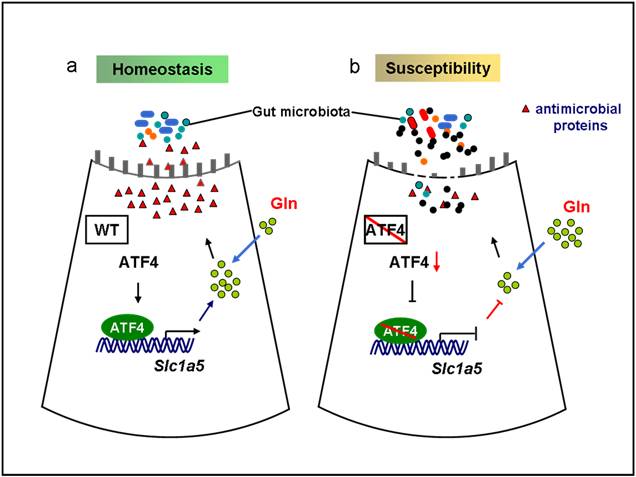
In a recent study published in Gastroenterology, Prof. GUO Feifan's group at the Shanghai Institute of Nutrition and Health of Chinese Academy of Sciences, collaborating with researchers from the Shanghai Tenth People’s Hospital of Tongji University, revealed the new function of amino acid sensing protein activating transcription factor 4 (ATF4) in maintaining the secretory function of Paneth cell and regulation of intestinal inflammation.
The investigation of the function of ATF4 was carried out in patients' samples with inflammatory bowel diseases (IBDs) and tissue-specific knockout mice.
Inflammatory bowel disease (IBD), including Crohn’s disease (CD) and ulcerative colitis (UC), is one of the most prevalent gastrointestinal diseases worldwide. To date, more than 200 IBD risk loci have been identified to be related to the inflammatory response, endoplasmic reticulum (ER) stress, innate and adaptive immunity, antimicrobial defence, autophagy, and gut mircobiota.
Paneth cells are specialized epithelial cells located at the base of small intestinal crypts that act as important effectors of innate immunity through their secretion of antimicrobial peptides. Recent works have reported that the level of amino acids is closely related to the secretion of antimicrobial peptides by Paneth cells, and disruption of genes associated with amino acid homeostasis may increase the susceptibility to IBD.
Prof. GUO's group has focused on studying the mechanism of amino acid sensing for years, and they have found that amino acid sensing protein ATF4 plays an important role in regulating glucose and lipid metabolism in the central and liver.
In this study, researchers demonstrated that levels of ATF4 were significantly decreased in inflamed intestinal mucosa from patients with active CD or active UC, compared with uninflamed regions or intestinal mucosa from healthy controls, and ATF4 expression was also down-regulated in colonic epithelia from mice with colitis compared to control.
Besides, they found that intestinal epithelial cell (IEC)-specific Atf4 knockout (Atf4ΔIEC) mice developed spontaneous enterocolitis and increased susceptibility to dextran sulfate sodium (DSS)-induced colitis. Atf4ΔIEC mice were revealed to have decreased serum levels of glutamine and reduced levels of antimicrobial peptides, and then alterations in ileal microbiomes. Injections of antimicrobial peptide (recombinant DEFA1) and glutamine reduced the severity of spontaneous enteritis and DSS-induced colitis.
Mechanically, the expression of solute carrier family 1 member 5 (SLC1A5), a glutamine transporter, was directly regulated by ATF4 in vivo and in vitro. Overexpression of SLC1A5 in vitro increased glutamine uptake and expression of antimicrobial peptides, and reduced Atf4-knockdown induced cytokine expression. In inflamed intestinal mucosa of IBD patients, SLC1A5 expression was decreased and positively correlated with ATF4 expression.
This study revealed that ATF4 deletion in inflamed intestinal mucosa in IBD decreases glutamine uptake and antimicrobial peptide expression by diminishing Slc1a5 transcription, and ATF4 may serve as a therapeutic target for the treatment of IBD.

The model of ATF4 in regulating intestinal inflammation (Image by Prof. GUO Feifan’s Group)

86-10-68597521 (day)
86-10-68597289 (night)

86-10-68511095 (day)
86-10-68512458 (night)

cas_en@cas.cn

52 Sanlihe Rd., Xicheng District,
Beijing, China (100864)

